Woman refuses to give her partner equity in her house in exchange for chores. AITA? ‘This is unfair.’
You: 33/F Your partner: 36/M How to / Personal Finance Have I, a 33/M, been the ahole for not giving my partner full equity in a house we are to buy together? You’re in a relationship where the two of you are financially lopsided: you’re the sole owner of your current townhouse, pay the majority of the bills, and are selling that townhouse to buy a house that you’re completely buying yourself. Your partner is a 36-year-old PhD student who pays next to nothing in rent and mainly pays by doing a lot more of the housework and cooking than you do.
Which really brings us to the crux of the issue why you asked him to sign a cohabitation agreement that is designed to protect your finances and preserve your independent standing by excluding you from obligations such as spousal support in the event of a separation. Your partner thinks his share of housework and cohabitation deserve an interest in the property; you think that’s unfair, because he hasn’t contributed a dime to the purchase or maintenance of the property. And you are also worried about what it may mean legally, due to your common law marriage statute, that he could be entitled to more than you would want him to be entitled to, if the relationship does not go all the way.
Read for more info Reddit
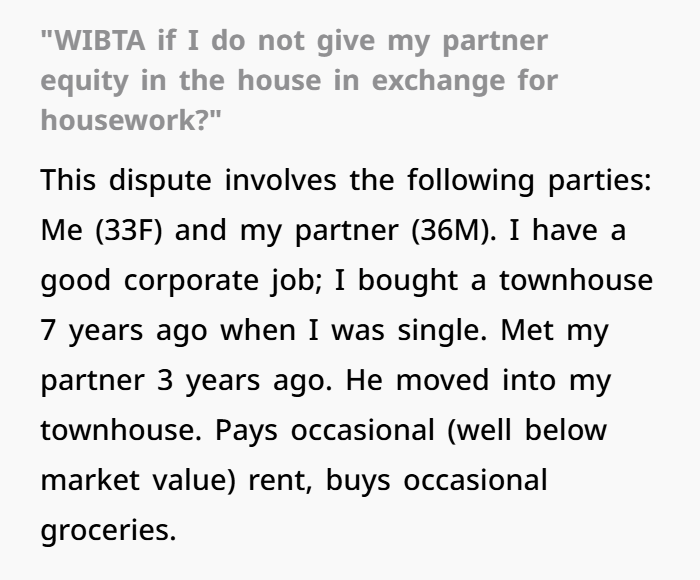

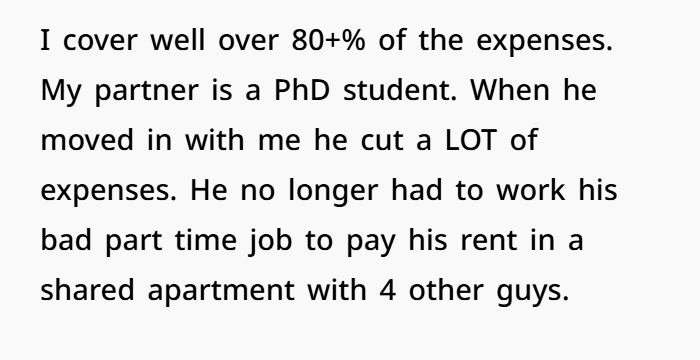
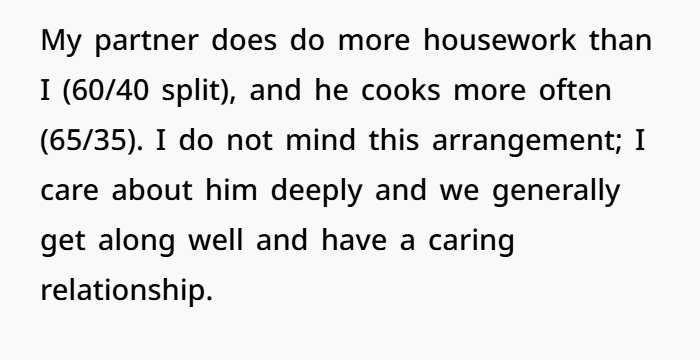

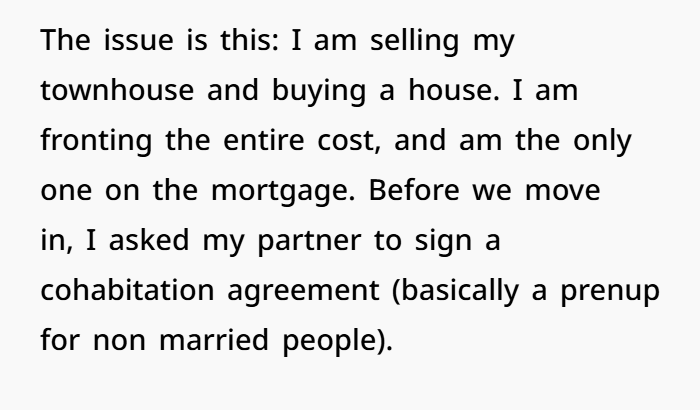

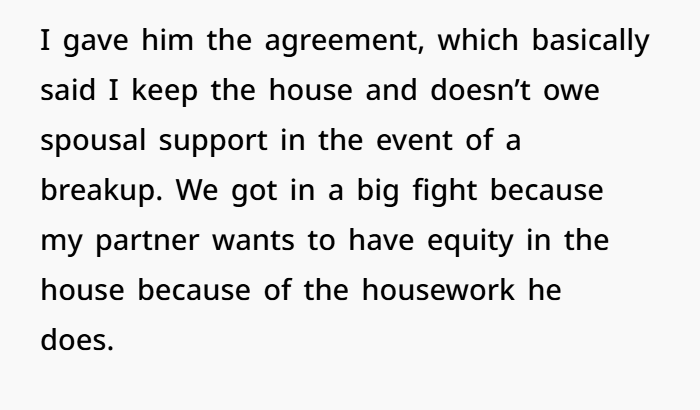

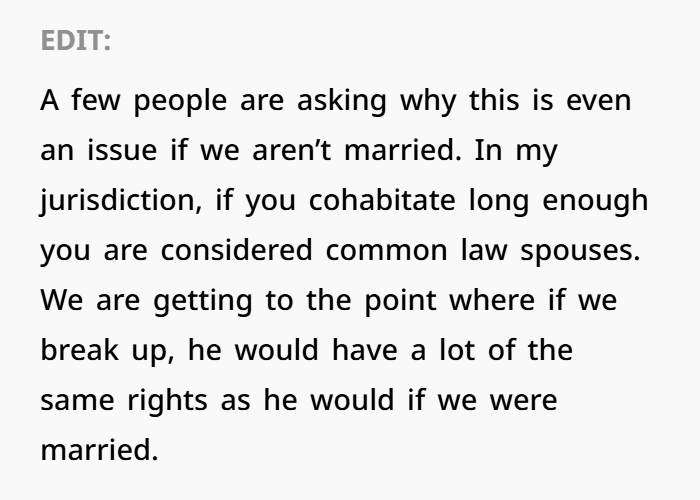
1. Common-Law Marriage and Property Rights
- In jurisdictions where common-law relationships are recognized, cohabitating partners may acquire rights similar to those of married spouses after a certain period. This could include property division and spousal support, even if the property is solely in one partner’s name. It’s crucial to understand the specific laws in your area to assess your partner’s potential legal claims.
- For example, in Canada and some U.S. states, courts may consider indirect contributions—like housework or cooking—as grounds for claiming equity in property. While signing a cohabitation agreement is a proactive step, its enforceability can vary depending on local laws and whether both parties received independent legal advice.
2. Unpaid Domestic Labor and Equity
- Your partner’s argument for equity in the house based on housework highlights a broader societal debate: the economic value of unpaid domestic labor. Studies estimate that domestic labor contributes significantly to household functioning, but it is often undervalued. However, in your case, the imbalance in financial contributions complicates this claim.
- Legal precedent often considers whether housework directly increased the value of the asset. If your partner’s contributions were more related to maintaining the household than directly improving the property’s value, this weakens his argument for equity.
3. Cohabitation Agreements: A Practical Safeguard
- A well-drafted cohabitation agreement can help protect your assets while clarifying expectations. However, for it to hold up in court, both parties typically need to:
- Have independent legal representation.
- Sign the agreement voluntarily without coercion.
- Disclose all relevant financial information transparently.
- It’s worth consulting a lawyer to ensure the agreement accounts for common-law considerations and clearly distinguishes your financial contributions from his domestic ones.
4. Relationship Dynamics and Emotional Impact
- Financial inequality in relationships can lead to resentment, especially if one partner feels undervalued. While you’re justified in protecting your investment, it’s important to acknowledge your partner’s perspective. Framing housework solely as “not enough” to warrant equity might make him feel dismissed.
- Consider discussing alternative arrangements, like increasing his financial contributions (e.g., paying more rent) to reflect shared household responsibilities. This could reinforce fairness without risking your asset.
5. Case Studies and Precedents
- In a notable Canadian case (Kerr v. Baranow, 2011), the Supreme Court ruled that non-financial contributions (like caregiving and housework) could lead to a claim for unjust enrichment, granting one partner a share of the other’s assets.
- However, courts often differentiate between contributions that enhance personal living conditions (e.g., cleaning, cooking) versus those that directly contribute to asset growth (e.g., renovations, financial investment).
Here’s what top commenters had to say about this one:

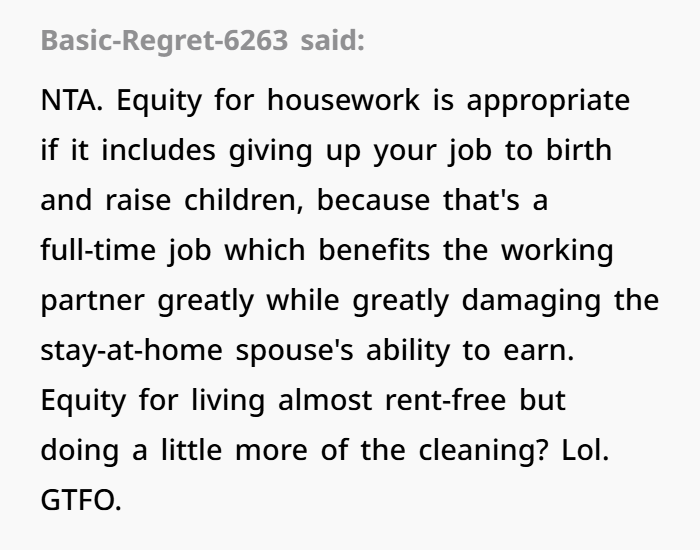

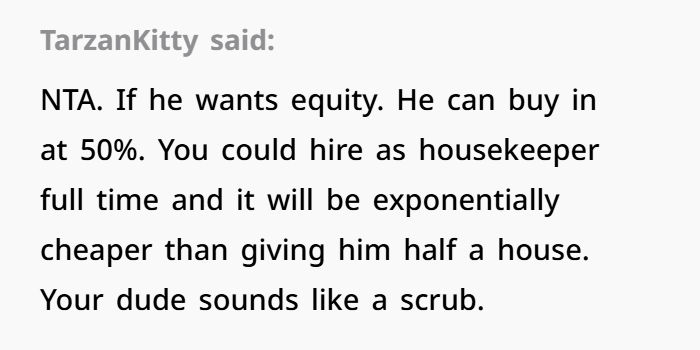

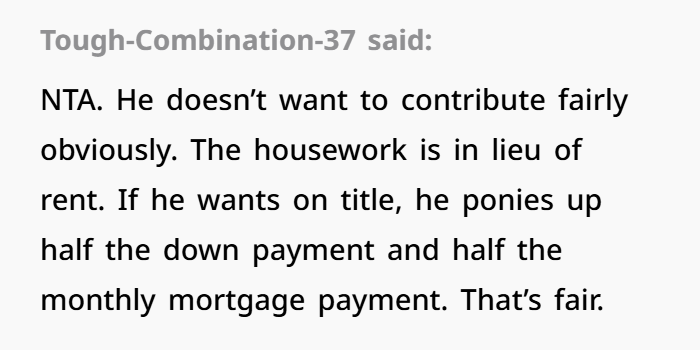
You should want to protect your financial assets, and you are not wrong for doing so, especially when you carried the ultimate financial weight of the relationship. But equity is not merely financial, it is about some other contribution share in fairness to the partnership as well. Talk with your partner about potential compromises — like lowering the rent or providing some other benefit (not equity-based) that will help move you toward a common goal, such as a joint savings account in the future. We can help you preserve the integrity of the relationship, but still achieve a level of asset protection — with the help of legal counsel and a proper understanding of the laws in your community.

